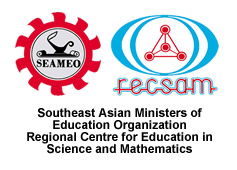Editorial Board (Issue 2 - 2007)
Dr Azian T.S. Abdullah (Advisor)
Devadason Robert Peter (Chief Editor)
Dr Cheah Ui Hock (Editor)
Dr Wahyudi (Editor)
Ng Khar Thoe (Editor)
Contents
1. Enlivening Problems with Heuristics Through Learning Activities and Problem Solving (LAPS)
Jerome A. Chavez
Problem-solving receives much emphasis in the mathematics curriculum. The use of heuristics as an approach to problem-solving is equally significant. From the time Polya (1946) introduced heuristics to the present, there has been a significant change in the way teaching mathematics has been delivered. LAPS, which stands for Learning Activities and Problem Solving is an intervention strategy using heuristics approach designed to elicit active participation from students during a mathematical problem-solving activity. This paper discusses the impact of LAPS to students’ performance on mathematical problem solving of primary school students. Eighteen standard 4M primary pupils of a boys’ school in Penang, Malaysia participated in the study. Based on the individual mean score of pupils during the pretest, the overall mean of the students on creative problem solving was 15.17 (of a possible 25) which is quite low. When LAPS was introduced as a strategy to solve problems, the pupils improved their problem-solving performances. This study shows that LAPS station is an effective approach in learning problem-solving. The students found the activities fun and engaging. The enthusiastic responses from the pupils imply that given proper motivation, clear instructions and challenging activities, the pupils appreciate mathematics positively and constructively.
2. Teaching Mathematics Incorporating Values-based Water Education via Constructivist Approaches
Ng Khar Thoe, Teoh Boon Tat, Tan Khan Aun
Sustainability issues have ever frequently being made themes at high level talks and conferences. However how far have these issues being practiced at the grassroot level? Sustainability of essential water is such an issue. Science Across the World (SAW), an international web-based learning programme provides an excellent avenue to create awareness among school students, enabling collaboration locally as well as insight sharing globally. A cross-curricular mathematics lesson using the constructivist learning theories was developed emphasizing problem-based learning (PBL) activities. Students’ interest in learning mathematics was enhanced with human values inculcated through real life activities. Issues are discussed and possible solutions elaborated. This lesson was introduced to 8 teachers and teacher educators from SEAMEO member countries attending a one month course in SEAMEO RECSAM on online mathematics teaching and learning (6th November to 1st December 2006). Part of the lesson was also piloted among students aged between 12 to 13 years old (in TSSSSS on 29th October 2006), in Regional Training of Trainers (TOT) course on promoting ‘Human Values-based Water, Sanitation and Hygiene Education’ (HVWSHE) in Southeast Asian Schools which was held at RECSAM from 16th to 25th May 2007. It was later tried out again in TSSSSS between the periods of July and October.
3. “Measure up to the Standard” A Preliminary Study on the Teaching & Learning of Measurement Skills
Law Peng Tee, Tan Tiong Meng, Susan Chua, Sean Chng
The purpose of this paper is to share the outcomes of a 3-month study that focused on the teaching and learning of measurement skills of Primary Three pupils in Yangzheng Primary School using two specially prepared resource packages. Resource Packages 1 and 2 aim to teach pupils’ specific sub-skills in the measurement of straight lines and curved lines respectively to address their difficulties in measurement. They comprise lesson plans and activity sheets developed by teachers in the school Mathematics committee. Our research indicates that pupils would benefit to a certain extent, from the teaching of the two resource packages.
4. Language Development Strategies for the Teaching of Science in English
Tina Lim Swee Kim, Mah Chee Wai
While most teachers recognize the urgent need to help students who lack proficiency in the English Language better grasp scientific concepts and principles, many are unaware of the role they ought to play in lowering the language barrier in science learning. Fewer still have been taught specific techniques for supporting students’ use of English in learning science. This article aims to provide some ideas into how teachers can be that language and content mediator in the science classroom, successfully intervening in language related problems and a result of that, optimise their students’ potential in learning science.

